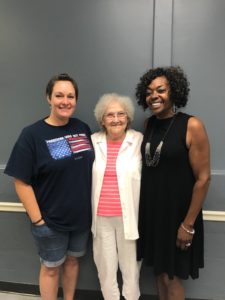The success story below was provided by Mid-Cumberland Community Action Agency (MCCAA) in Tennessee.
The Richness of Gratitude
“None is more impoverished than the one who has no gratitude. Gratitude is a currency that we can mint for ourselves, and spend without fear of bankruptcy.” – Fred DeWitt Van Amburgh.
If Mr. Van Amburgh’s reasoning that the poorest of us is the person that is not thankful or grateful for anything they have, then Mrs. Dorothy Ryan is certainly among the richest of us, despite the implications of her meager income. Indeed, Mrs. Ryan is a joyful soul that oozes of gratitude for her recent assistance and is eager to tell you how happy she is about the changes she has incurred. Hers is a testimony of thankfulness and a face that brightens even the gloomiest of rooms with sincere appreciation.
Dorothy entered the Elderly and Disabled Services (EDS) Program of Mid-Cumberland Community Action Agency’s Case Management Plan in December, 2017. The program is designed to help sustain elderly and disabled individuals living on a fixed income. Dorothy needed help paying a high utility bill, but in an interview with Case Manager Paula Daniels, Paula realized she could help Dorothy with much more through the EDS Program and community resource referrals.
MCCAA’s Low-Income Home Energy Assistance Program (LIHEAP) awarded Dorothy $450 to pay toward electric bills in January, 2018. Paula asked Dorothy about her property tax statement and learned that Dorothy’s bill of $700 would leave her extremely short in meeting monthly expenses with her meager fixed income. Through an EDS grant, Paula helped Dorothy with $500 toward her tax bill and also provided her with food and hygiene products from MCCAA’s food pantry. With Paula’s assistance, Dorothy was also able to apply for a tax freeze on her property so her taxes would not increase during her lifetime. Dorothy’s property, however, needed more than just tax relief. Paula was able to go yet another step further to assist Dorothy.
Dorothy and her husband built their home in 1962 and raised a family there. Since her husband’s death four years ago, Dorothy had neglected home maintenance due to her limited income and inability to fix things herself. Paula referred Dorothy to Westminster Home Connection (WHC) for repair assistance. WHC conducted an assessment, and Paula performed a home visit. Upon WHC approval, repairmen went to work on Dorothy’s house. They replaced the entire bathroom floor, installed a new screen door on the front door that had been bent from a tornado, re-wired electrical outlets and grounded new plugs, fixed a leak in the kitchen sink and replaced the faucet, caulked windows, installed new smoke detectors in the bedrooms, replaced a smoke detector in the hallway, replaced the crawl space door, and completely cleaned underneath the house.
“Those were the most mannerly, courteous men I have ever seen,” exclaimed Dorothy regarding the repairmen from WHC. “There is no way I could have had anything done without their help. On a fixed income, you have no money left to do repairs,” Dorothy explained. She added, “It is hard to find trustworthy people to help you and to do good work without ripping you off. When you are by yourself, you get a lot of squirrels who want to help you.”
Dorothy no longer drives due to recent and impending eye surgeries. She relies heavily upon her granddaughter, Heidi Combs, to assist her with transportation. “It has been a huge blessing to have trustworthy help for my grandmother,” said Heidi. Heidi, mother of seven, helps Dorothy all she can while taking care of her own household.
Paula also assisted Dorothy with another $300 toward light bills in May and continues to provide her with food and hygiene items through the food pantry. After six months in the EDS program, Paula successfully moved Dorothy out of Case Management since assistance from MCCAA and WHC had greatly relieved her of financial pressures and made her life more manageable. Dorothy Ryan is one happy lady due to a community that was willing to look at her as an individual, care about her needs, and provide her with the necessary assistance to overcome barriers that prevented her from independence as an elderly, disabled person. Her gratitude is contagious, and everyone would be much happier if infected.





